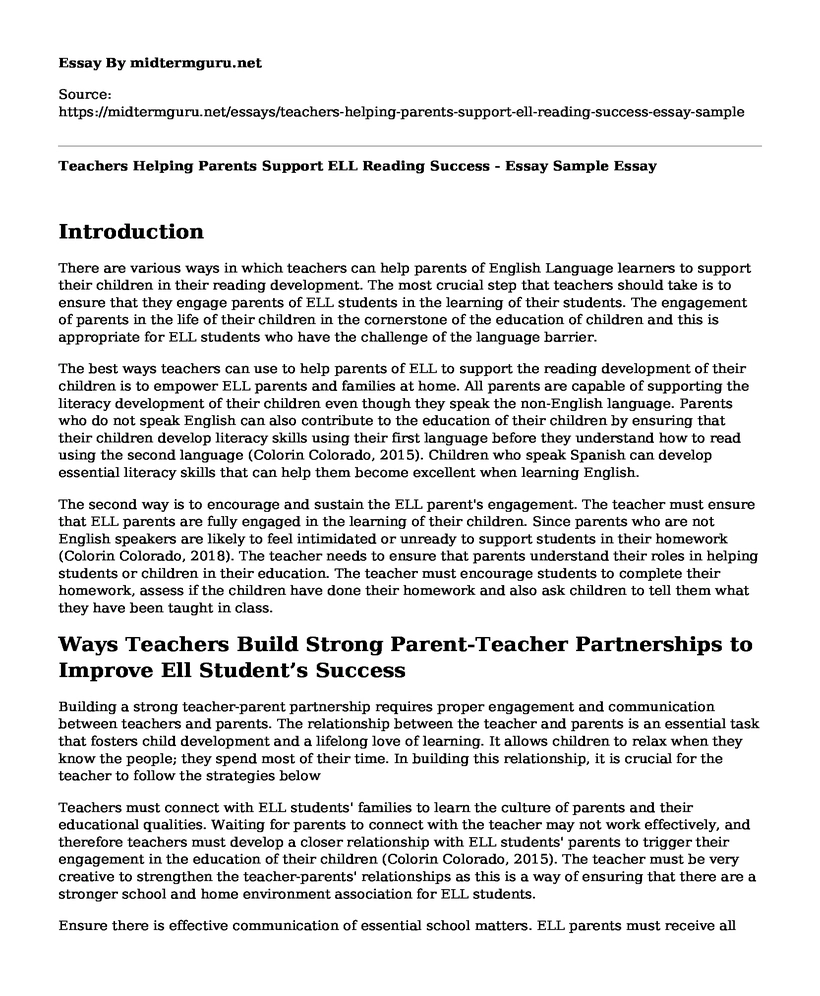Introduction
There are various ways in which teachers can help parents of English Language learners to support their children in their reading development. The most crucial step that teachers should take is to ensure that they engage parents of ELL students in the learning of their students. The engagement of parents in the life of their children in the cornerstone of the education of children and this is appropriate for ELL students who have the challenge of the language barrier.
The best ways teachers can use to help parents of ELL to support the reading development of their children is to empower ELL parents and families at home. All parents are capable of supporting the literacy development of their children even though they speak the non-English language. Parents who do not speak English can also contribute to the education of their children by ensuring that their children develop literacy skills using their first language before they understand how to read using the second language (Colorin Colorado, 2015). Children who speak Spanish can develop essential literacy skills that can help them become excellent when learning English.
The second way is to encourage and sustain the ELL parent's engagement. The teacher must ensure that ELL parents are fully engaged in the learning of their children. Since parents who are not English speakers are likely to feel intimidated or unready to support students in their homework (Colorin Colorado, 2018). The teacher needs to ensure that parents understand their roles in helping students or children in their education. The teacher must encourage students to complete their homework, assess if the children have done their homework and also ask children to tell them what they have been taught in class.
Ways Teachers Build Strong Parent-Teacher Partnerships to Improve Ell Student’s Success
Building a strong teacher-parent partnership requires proper engagement and communication between teachers and parents. The relationship between the teacher and parents is an essential task that fosters child development and a lifelong love of learning. It allows children to relax when they know the people; they spend most of their time. In building this relationship, it is crucial for the teacher to follow the strategies below
Teachers must connect with ELL students' families to learn the culture of parents and their educational qualities. Waiting for parents to connect with the teacher may not work effectively, and therefore teachers must develop a closer relationship with ELL students' parents to trigger their engagement in the education of their children (Colorin Colorado, 2015). The teacher must be very creative to strengthen the teacher-parents' relationships as this is a way of ensuring that there are a stronger school and home environment association for ELL students.
Ensure there is effective communication of essential school matters. ELL parents must receive all the school scheduling and other relevant information in their native language to get the message the school is sending (Calderon & Minaya-Rowe, 2003). The use of native language to communicate with parents is the best way to talk to parents, and this does not offer a disservice to parents.
The teacher should tailor their approach to the cultural tradition of ELL students' parents. The teacher should ensure that they use what they have learned when establishing contact with other family members to understand the cultural norms of ELL student's parents (Colorin Colorado, 2018). This is a way of empowering parents to engage in learning of their students thoroughly.
Work Cited
Colorin Colorado. "Empowering ELL Parents & Families at Home." Colorin Colorado, 1 Dec. 2015, www.colorincolorado.org/article/empowering-ell-parents-families-home.
Colorin Colorado. "Encouraging and Sustaining ELL Parent Engagement." Colorin Colorado, 16 Aug. 2018, www.colorincolorado.org/article/encouraging-and-sustaining-ell-parent-engagement.
Calderon, M. E., & Minaya-Rowe, L. (2003). Designing and implementing two-way bilingual programs. A step-by-step guide for administrators, teachers, and parents.Thousand Oaks, CA: Corwin Press
Cite this page
Teachers Helping Parents Support ELL Reading Success - Essay Sample. (2023, Jan 08). Retrieved from https://midtermguru.com/essays/teachers-helping-parents-support-ell-reading-success-essay-sample
If you are the original author of this essay and no longer wish to have it published on the midtermguru.com website, please click below to request its removal:
- Essay on Black Lives Matter Movement and Increase of Crime Rate
- Essay on Clinical Career Experience and Its Significance
- Questions and Answers on Communication With Customers - Paper Example
- Definition Essay Sample on Serenity
- Explore Consciousness - Waking, Self-Awareness and Altered States - Essay Sample
- Indigenous People: Contrasting Global Capitalism & Traditional Perspectives - Research Paper
- Improving Clinician Communication: How SAFER Aids in EHR Integration - Essay Sample







